|
|
|
Sort Order |
|
|
|
Items / Page
|
|
|
|
|
|
|
| Srl | Item |
| 1 |
ID:
132970
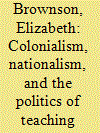

|
|
|
|
|
| Publication |
2014.
|
| Summary/Abstract |
For Palestinian nationalists in Mandate Palestine, British education policy was a source of constant frustration. The shortage of schools, the lack of local control over the curriculum, and the marginalization and de-politicization of Palestinian history constituted major grievances. Proceedings from the Peel Commission reveal much about the rationale behind this policy, particularly the bias toward "rural" education and the attempts to control teachers. Drawing on and complementing the work of A.L. Tibawi, this article seeks to shed light on the nationalists' protests by examining both the responses of officials brought before the Commission, as well as the government's history curriculum during the Mandate. In doing so, the research shows that education policy was constructed to maintain the underdevelopment of Palestine and to hinder state-building efforts that could compete with those of the Zionists.
|
|
|
|
|
|
|
|
|
|
|
|
|
|
|
|
| 2 |
ID:
115351
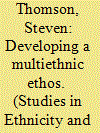

|
|
|
|
|
| Publication |
2012.
|
| Summary/Abstract |
This examination of local government reform in The Gambia asserts that - contra Mamdani's (1996) generalisations that colonial policies of indirect rule in Africa universally determined that ethnicity is the master code through which ordinary people interact with local manifestations of the state - in some cases colonial administration contributed to more pluralist local politics. Further, I argue that the logics of developmentalism have joined with local models of political legitimacy to generate communities that actively choose to define themselves explicitly as multiethnic entities. My case study focuses on the process conducted in one village of drafting a constitution for its Village Development Committee in anticipation of the Local Government Act of 2000. That a local community took advantage of such a critical juncture to reassert its own moral order is not surprising; however, that this local moral order explicitly recognises and protects ethnic diversity runs counter to dominant narratives about Africa that equate ethnic diversity with conflict.
|
|
|
|
|
|
|
|
|
|
|
|
|
|
|
|
| 3 |
ID:
115289
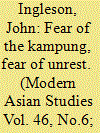

|
|
|
|
|
| Publication |
2012.
|
| Summary/Abstract |
This paper discusses the responses of The Netherlands Indies colonial government to the rise in urban unemployment in Java brought about by the 1930s Depression. At least one in six of the large European/Eurasian population in the colony, and an even larger proportion of urban Indonesian workers, became unemployed as a result of the Depression. The colonial government and the European community were greatly concerned that the growth of unemployment among Europeans would lead to destitution for many, ultimately forcing them into the native kampung1. They were also concerned about what they saw as the moral decay of local-born European/Eurasian youth who were unemployed in unprecedented numbers. Furthermore, the European community feared that the growth in unemployment among western-educated Indonesians in the towns and cities in Java would create a fertile recruitment ground for nationalist political parties leading to urban unrest. Fear of the kampung for destitute Europeans, and fear of urban unrest from unemployed western-educated Indonesians, shaped the colonial government's responses to urban unemployment. The impact of the Depression on both Indonesian and European unemployed in the towns and cities in Java triggered lengthy debates on the role of the state in the provision of social security.
|
|
|
|
|
|
|
|
|
|
|
|
|
|
|
|
| 4 |
ID:
091781
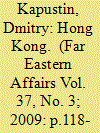

|
|
|
|
|
| Publication |
2009.
|
| Summary/Abstract |
This article is devoted to the 30-year-old Anton Chekhov's journey abroad on one of the vessels of the Volunteer Fleet, and to a little-known episode in Chekhov's life - his autumn, 1890, stay in Hong Kong, on the way from Sakhalin to Odessa - in particular. The article presents Chekhov's personal impressions of Hong Kong, taken from letters he wrote. The photos of Hong Kong, found in the Chekhov archives, are reproduced here for the first time.
|
|
|
|
|
|
|
|
|
|
|
|
|
|
|
|
| 5 |
ID:
192252
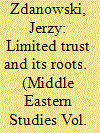

|
|
|
|
|
| Summary/Abstract |
In 1914–1918, 294,000 indigenous people were mobilized in North Africa and sent to the European front. Nearly 45,000 of them were killed or missing in action. This article examines the attitude of the French toward their North African soldiers and tries to explain why in the face of copious evidence of North African loyalty, the appreciation of courage and sacrifice in the fight against Germany was accompanied by suspicion and uncertainty about total loyalty. The article draws attention to the equal sacrifice belief in French thinking about the participation of colonial people in the war. It maintains that opposition to this belief, combined with the manifestations of soldiers’ identity, and the paternalism and racism on the part of the French authorities, created the limited trust of French officials in North African Muslim soldiers.
|
|
|
|
|
|
|
|
|
|
|
|
|
|
|
|
| 6 |
ID:
080622
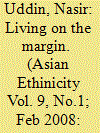

|
|
|
|
|
| Publication |
2008.
|
| Summary/Abstract |
The Chittagong Hill Tracts (CHT) of Bangladesh has long been represented as a region of multi-ethnic setting, ethnic conflict and ethnic movement in South Asia. However, inter-ethnic relationship through the practice of unequal power and positions among the 'Pahari' (hill-people), the inhabitants of the CHT, has largely been ignored in the deeper understanding of the CHT. In addition, available CHT literature talks mostly about numerically dominant ethnic groups, whereas less attention is paid to the marginalized 'Pahari' ethnic groups. This paper examines the positioning of the 'Khumi', one of marginalized Pahari ethnic groups, within the larger canvas of CHT vs state across times and regimes. In an attempt to identify the position of the Khumi within the sociopolitical and ethnic history of the CHT, it seeks answers to three central questions: (a) How did the Khumi appear in the demographic configuration of the CHT? (b) How had they, along with the CHT and its other inhabitants, been dealt with during the colonial and postcolonial regimes? (c) How do they position themselves in the recurrent sociopolitical dynamics of CHT vs state relationship? The paper is based on critical consideration of secondary sources on the region in collaboration with relevant comprehensive data collected through ethnographic fieldwork undertaken from November 2005 to April 2007 in the CHT of Bangladesh
|
|
|
|
|
|
|
|
|
|
|
|
|
|
|
|
|
|
|
|
|